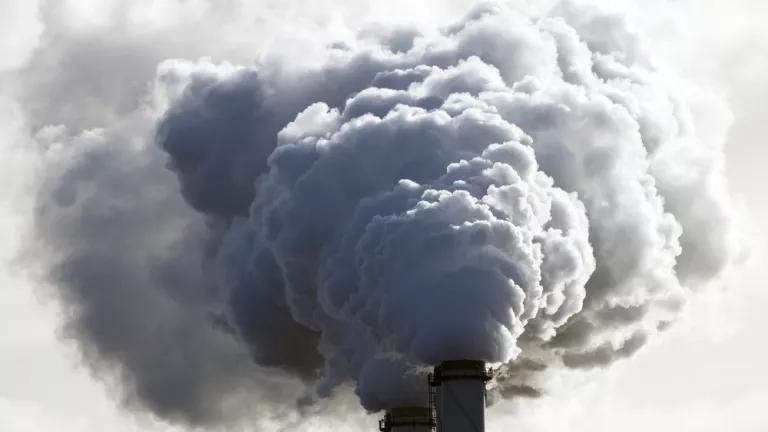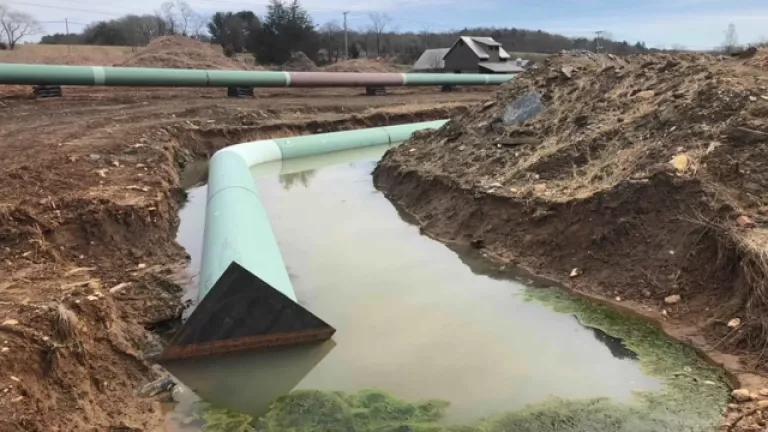
Climate Pollution Will Again Come Down, as Legislative Leaders Take Aim at Youngkin's Pro-polluter Assault on Virginia's RGGI Law
The pro-climate majority once again running Virginia’s General Assembly rightly seized their best opportunity to repudiate Gov. Youngkin’s unhinged and damaging attack on the 2020 centerpiece of Virginia’s historic climate action: RGGI.
Climate leaders rightly included in their recently-passed budget bill a reversal of Youngkin’s lawless attempt to remove Virginia, by executive fiat, from the climate-protecting Regional Greenhouse Gas Initiative (RGGI, pronounced “Reggie”). By simply utilizing the tried-and-true democratic process that Youngkin attempted to upend, it’s fitting that the legislature gets the final word on RGGI.
The General Assembly passed RGGI into law in 2020 to great, well-deserved fanfare. RGGI has, by design and as expected, slashed climate pollution from smokestacks by a whopping 20% in just three years. In that same three years, RGGI also delivered over $800 million for low-income efficiency upgrades and statewide flooding resilience.
And where did that crucial funding come from? Big polluters all around the Commonwealth, often owned by large out-of-state corporations: the Doswell fossil plant in Hanover County (which has likely coughed up over $100 million into Virginia coffers for its air pollution),the Tenaska fossil plant in Fluvanna County (about $60 million in pollution payments), the Potomac Energy Center fossil plant in Leesburg (about $70 million), or the Hopewell fossil unit near Richmond (about $20 million).
For Virginians staring down sea level rise and rising floodwaters, and the many billions in present and future climate damage, the 2020 legislature’s RGGI law has not only delivered $800 million in funding, but also cleaner air and a safer climate.
So, as the budget process works itself out and Virginia’s climate leaders put the finishing touches on a RGGI-protecting budget in the coming weeks, it’s worth a quick look at just how divorced from facts Youngkin’s anti-climate aggression against RGGI has been.
Youngkin’s Hyperbole Justifying His RGGI Attack Is Not Credible
To justify his attempted RGGI “repeal,” Youngkin mostly hangs his hat on the inflammatory claim that “RGGI is a tax.”
Nice try, Governor, but no, RGGI just ain’t a “tax.”
The facts: RGGI is simply a market-based mechanism to steadily slash air pollution year over year, using a tool already familiar to Virginia, as it’s the same method Virginia used to eliminate acid rain and smog.
How? By finally making polluters (not taxpayers) pay up for their annual pollution, while also steadily reducing their smokestack emissions each year. Prior to Virginia’s RGGI 2020 law, polluters got off scot-free for fouling our climate with carbon pollution, driving up the climate costs the rest of us have to pay. Under RGGI, big polluters recompense the Commonwealth for the climate damage they cause via payments for “carbon allowances.” (Those allowances are fungible and may be sold by a power plant that doesn’t need them; hence the term “cap-and-trade.”)
Left out of Youngkin’s fact-free "RGGI-is-a-tax!" hyperbole is that RGGI drives direct investment in energy efficiency upgrades in low-income homes and resilience programs against flooding. In its first three years alone, RGGI delivered over $800 million in polluter-funded investments. (And, if not for Youngkin’s currently-under-court-review attack, that figure would already be almost $100 million higher, in just the first three months of 2024 alone.)
So, no, RGGI is not a “tax.” It’s recompense from Virginia’s polluters.
And that includes out-of-state corporate polluters that own power plants that pollute Virginia’s air. Just four of them, the Doswell, Potomac, Tenaska, and Hopewell fossil power plants, have likely reimbursed Virginians over a quarter of a billion dollars. Rather than a “tax” on Virginians, that’s just an effective, long-proven approach to slashing air pollution. Forcing polluters to “internalize” the cost of their own air pollution (rather than dumping the burden on the rest of us) is precisely why the RGGI program is so popular and has slashed pollution across many, many states for over a decade and a half.
Underscoring the intellectual emptiness of Youngkin’s “RGGI is a tax!” hyperbole is his own proposal that we shift the costs of flooding away from the power plant polluters that cause it over to, wait for it, Virginia taxpayers. Even while falsely maligning RGGI as a “tax,” Youngkin instead proposes everyday Virginians should pay for climate flooding, with repeated calls to fund the flood resilience program through Virginia taxpayers’ own general funds. Again, polluters did so under RGGI, and they must be required to do so again.
Real World Facts Dispel Youngkin’s Other RGGI Talking Points
Youngkin’s other RGGI talking point is that, because Virginia happens to be a regulated state, RGGI somehow “fails to offer any incentive” to electric utilities to lower pollution.
Again, false: RGGI has, as planned and as expected, slashed power plant carbon pollution, year after year. Specifically, smokestack emissions dropped by about 13% in 2021, and down another 6% in both 2022 and 2023, for a whopping total of over 20% since the start of the RGGI program in 2021.
RGGI's pollution reduction success is no surprise: contrary to Youngkin’s pronouncements, RGGI’s very operation is, in and of its own design, an automatic incentive for Virginia utilities to lower pollution.
How? It’s simple: every ton of air pollution emitted in a RGGI state includes a market-based surcharge to polluters (currently around $15). Operationally, that means any fossil plant in the regional power market (called PJM) includes that carbon pollution cost in their operating cost. The effect of that is that cleaner resources get utilized first, automatically incentivizing the shift from dirtier plants to cleaner plants.
Indeed, that’s why, under RGGI, the heaviest polluting plants in Virginia have seen their operations plummet to closer and closer to zero. At the same time, moreover, clean zero-carbon energy resources, solar and wind, have grown by leaps and bounds, along with significantly cleaner air.
Climate Leaders Now Have Youngkin Cornered for His Unlawful Assault on the RGGI Law
Regardless of Youngkin’s fact-free justifications for attacking the RGGI law, the bottom line is that his attack was lawless. (Which, the Youngkin administration undoubtedly knows, but is just as happy to gum up the works with delays and litigation.)
The RGGI law is clear, with a whopping 32 unambiguous “shalls,” including that Virginia “shall” join RGGI (line 115); that Virginia “shall” direct 50% of RGGI proceeds to energy efficiency (line 132); and that Virginia “shall” direct RGGI proceeds to flood resilience (line 129), with 25% of that resilience to low-income areas (line 82).
That lack of ambiguity makes Youngkin’s attempt to remove standing law, by fiat, not just reckless, but particularly ripe for a correction by Virginia’s climate leaders in the legislature.
And that majority can do so via the budget, simply by following democracy’s regular rules of the road, now that the legislature gets its say. And it can’t happen soon enough: Youngkin’s interference and obstruction of RGGI has already cost Virginia, in just the first three months of 2024 alone, almost $100 million in polluter payments.
It is hard to imagine a more fitting end to Youngkin’s costly detour into anti-democratic governance: a duly elected, pro-climate action majority utilizes the regular, lawful process to shut down Youngkin’s attempted end-run around Virginia’s standing law.
It’s good for Virginians when the democratic system, in the end, functions as it should, and it’ll be good for the climate, too.



